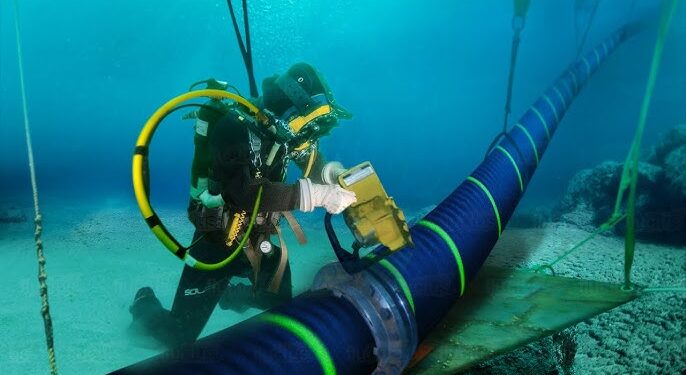Nigeria has urged the West African region to adopt a coordinated and multilateral strategy to collectively safeguard shared telecommunications infrastructure and expand connectivity options, thereby guaranteeing uninterrupted connections.
Dr. Reuben Muoka, the Director of Public Affairs (DPA) at the Nigerian Communications Commission (NCC), made this statement on Sunday in response to recent challenges in connectivity within the West African region due to undersea cable cuts.
Muoka relayed that Dr. Aminu Maida, the Executive Vice-Chairman of NCC, conveyed this message during a speech delivered at the 21st Annual General Meeting (AGM) of the West Africa Telecommunications Regulatory Assembly (WATRA), which took place in Freetown, Sierra Leone.
Furthermore, Muoka mentioned that NCC’s Deputy Director of Public Affairs, Nnenna Ukoha, delivered Maida’s message at the WATRA AGM.
Maida said that “the recent submarine cable cuts that resulted in nationwide outages on multiple networks affected 12 African countries.
“It had raised the urgent need for the subregion to establish a mechanism to protect itself from damage to submarine infrastructure and its attendant impact on the subregion.
Maida referred to a report by Cloudflare, an IT service management firm, which indicates that about six countries, including four West African countries, still had outages caused by the submarine cable cuts.
“Securing telecom infrastructure is paramount for fostering Foreign Direct Investment (FDI) and enhancing investor confidence in the West African sub-region.
“The reliability and resilience of telecommunications networks are crucial factors that investors consider when evaluating regional opportunities.
“By ensuring the security of these vital assets, we can attract more investment, spur economic growth, and enhance our competitiveness on the global stage.
“A secure telecom infrastructure not only facilitates efficient communication and connectivity but also signals a commitment to safeguarding critical assets essential for business operations.
“This assurance can significantly boost investor confidence and create a conducive environment for sustainable economic development.
“The impact of events like cable cuts highlights the need for a coordinated, multilateral approach to protecting shared infrastructure across our member nations.”
Maida also proposed the urgent need to set up a framework for joint monitoring, risk mitigation, and emergency response procedures for the submarine cables that pass through the sub-region.
“Further to this, we recommend that the WATRA Working Group on Infrastructure expand its mandate to spearhead the development of a comprehensive strategy to safeguard the subregion’s telecommunications networks.
“To also safeguard associated infrastructure, thereby proactively bolstering resilience through improved disaster response protocols, to better insulate ourselves from future disruptions.”
He stated that the objectives of the Working Group would include enhancing the resilience of sub-regional infrastructure, fostering the diversification of connectivity within the sub-region, and conducting periodic capacity evaluations.
The statement clarified that the Working Group would facilitate the classification of telecommunications infrastructure as critical national assets in member countries.
“The West Africa Telecommunications Regulators Assembly was established in 2002 as a common platform for national telecommunication regulatory authorities in 16 member states.
“To promote the adoption of regulations that stimulate investment in telecommunication infrastructure to deliver more affordable, accessible, faster, and secure communication services to citizens.
“At the 21st WATRA Annual General Meeting, issues pertaining to accessible and affordable telecommunication services in the sub-region were discussed, including improved consumer protection, quality of service, roaming, and conflict resolution for consumers.
“A major highlight of the AGM was the re-election of Nigeria’s Yusuf Aboki as Executive Secretary for a second term in a unanimous vote by the member countries.”
The statement highlighted Aboki’s commendation for his strong, inclusive, and forward-thinking leadership, which led to the successful implementation of WATRA’s 2022-2025 Strategic Plan.
Moreover, Nigeria and the entire sub-region celebrated the significant milestones achieved during his initial term.
Additionally, he encouraged the Executive Secretary of WATRA to capitalize on the accomplishments of his previous term by fostering stronger partnerships and deeper collaboration while advancing the interests of the sub-regional organization.



